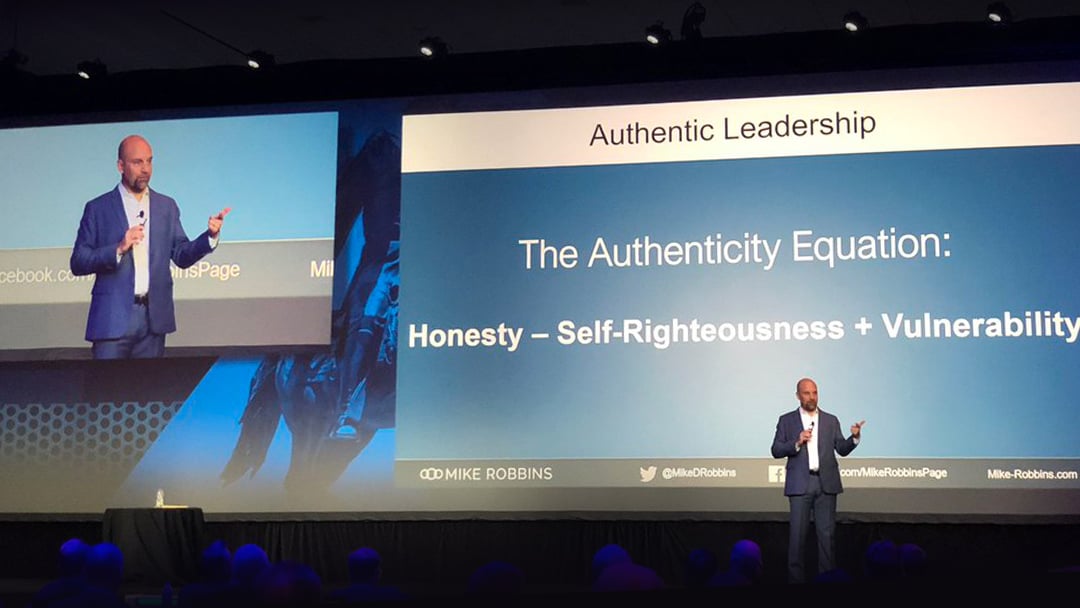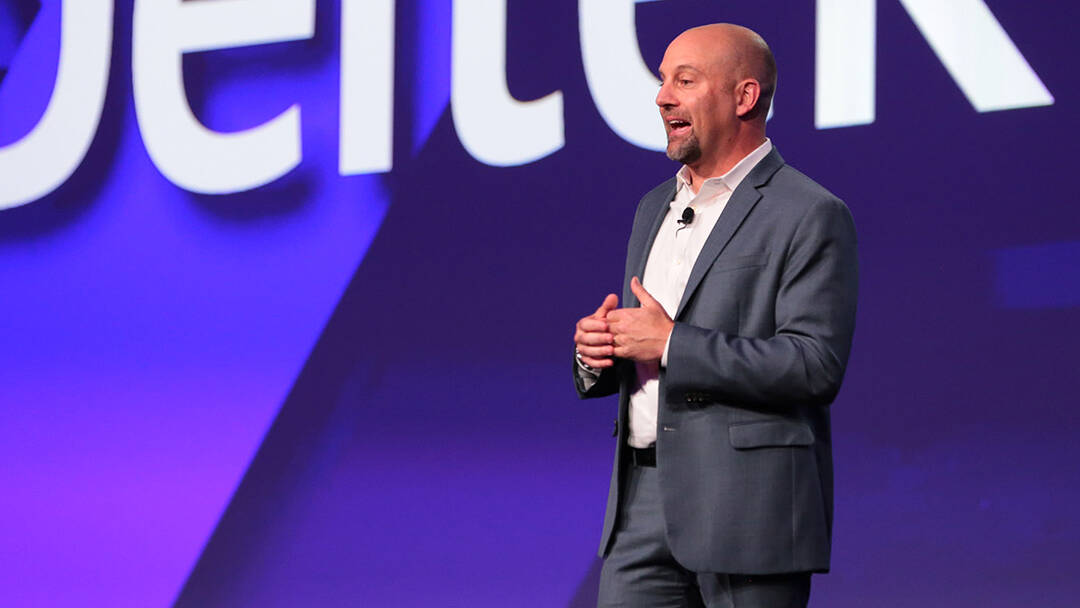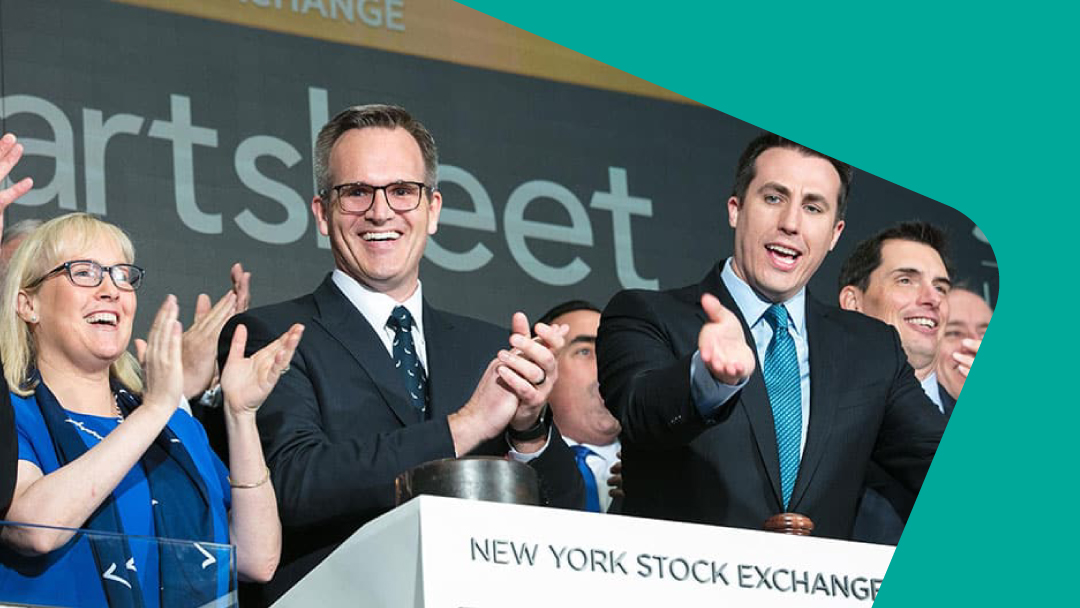Editor’s Note: Smartsheet hosts an ongoing speaker series for its employees to bring new ideas to our global team. The series is an opportunity for employees to engage with experts on effective communication, unconscious bias, and other topics that are both professionally and personally relevant to our employees and team culture. Past speakers include Kim Scott, Dr. Mahzarin Banaji, Kevin Carroll, and Mike Robbins.
If you missed the first part of our interview with Mike Robbins, click here to read his thoughts on appreciation versus recognition, how to create engaging company culture, and more.
Recently, Mike Robbins delivered a talk to Smartsheet employees, sharing many compelling concepts that appear in his latest book Bring Your Whole Self to Work. Robbins is an expert in teamwork, leadership, and building winning company cultures that keep employees engaged.
In part two of our interview with Robbins, he discusses how authenticity impacts team performance, the importance of psychological safety, and the three questions a leader can ask their team that can transform their happiness at work.
Stephen Danos: How does authenticity impact team performance? What are some ways we can be more open with each other?
Mike Robbins: I define authenticity as honesty minus self-righteousness, plus vulnerability. As hard as it is, being vulnerable doesn’t always involve disclosing personal details, your life story, or all of your fears, doubts, and insecurities.
There are people who are really authentic who keep their personal lives private when they’re at work, but they're willing to be real and vulnerable in the moment. That means politely speaking up if you don’t understand a concept, if you need help, when you make a mistake, or when you disagree on a decision.
Individuals and managers also must be aware of gossip and team divisions through triangulation. Gossip can spread, erode professional relationships, and negatively impact your company culture. Even if two colleagues are complaining about a co-worker who gets on their nerves, it sets up a dynamic of skepticism and mistrust. You might think: “My co-worker confides in me, but are they telling others when I complain?”
Along those same lines, it’s important for people to feel safe. Keep confidential information confidential, especially if you’re in management and leadership positions.
"We have to remember: There are no insignificant acts when you're a leader."
Mike Robbins
Related
A 4-Star General Shares His Secrets for Successful Leadership
SD. How can companies and teams promote and improve upon their policies around psychological safety? How can they account for different personality types?
MR: Lately, I’ve been thinking about inclusion as related to belonging. How do companies and leaders create an environment where people feel like they belong? On Maslow's hierarchy of needs, the level right beneath “survival” is “belonging.” And culture is the environment we create to make sure we belong to something that's bigger and more important than us, as individuals.
This brings an example to mind: the notion of handedness. About 10 percent of the world’s population is left-handed, which means most things are catered to the overwhelmingly right-handed majority. But if you’re left-handed sometimes desks, notebooks, and scissors don’t work for you. Most right-handed people don’t notice this discrepancy.
"A big driver of inclusiveness is staying curious about and honoring what makes people different, and understanding the challenges employees face because they are not part of the majority."
Mike Robbins
Then leaders have to ask: “Is the environment safe enough where those people feel like they can speak up and voice their opinion or perspective?” It should be just as commonplace for employees to speak to their manager or team about their gender, personality type, race, age, etc., as it is to speak about being left-handed.
Related
How Purposeful Play Makes Teams Faster
SD: Based on all the leaders and companies you’ve worked with, what’s a reliable and practical way for managers to improve engagement?
MR: One way is to anonymously survey employees, so you can try to collect as much real feedback as possible. Another way I’ve come across is more direct.
About 10 years ago, I worked with a leader employed by a major financial institution. He developed a great way for getting face-to-face feedback with his team during a company merger. As part of their regular 1-on-1 meetings, the leader would ask his team members three questions:
What do you want me to start?
What do you want me to stop?
What do you want me to continue?
This idea elicited very direct and specific feedback from people on his team as they were going through a lot of change and uncertainty. He wanted them to be truthful and transparent, so they were participating in authentic dialogue.
So the team regularly practiced this model for safe, constant feedback in a way that enabled team members to share how they felt during the transition period and beyond, which boosted the team’s engagement with each other and the company at large.
"You could be the most experienced leader in the world and know your team really well, but you can’t know what they’re thinking unless they tell you."
Mike Robbins
Related
3 Traits of Successful Business Leaders
SD: Can you share an additional example of a team that successfully put your ideas into practice?
MR: When it comes to leadership teams, I’m a strong believer in first teams versus second teams. The first team is the team you’re a member of, while the second is the one you manage. Simply put, you’re a member of the team that are your peers, not the team that reports to you.
In the Bay Area, I’ve worked with a senior leadership team that reports to the company’s CEO. I covered the first versus second team concept at one of their team offsites. After the session, one of the team members realized that they were not relating to each other as an actual leadership team; they were more like a team of leaders.
The senior executives created a Slack channel and group text to strengthen their bond as a team, as opposed to a collection of leaders who manage different areas of the business. After making these subtle changes, one of the leaders reported that it changed the culture of not just the leadership team, but their entire marketing organization, because they are now aligned as a team.
Related
Do These 5 Things for a More Productive Remote Team
SD: In an interview setting, how can hiring managers assess candidates for authenticity, appreciation, and growth mindset?
MR: There’s this great team-building exercise that I think applies to an interview setting: “If you really knew me, you’d know this about me.” This doesn't mean you have to share personal details; an answer can be as simple as “I’m an avid hiker” or “I’m learning how to play the piano.”
If interviewers and hiring managers are willing to lead off the discussion and share first, they can provide examples and set expectations for the candidate, all while being authentic and vulnerable. The exercise opens up the conversation and breaks through the tension for both the interviewer and interviewee.
Another way is to ask the following question: What did you say to the most important person in your life about the interview before you came in for the interview?
This can tell you what matters to them and how they prepared for the interview. Just make sure you make the conversation safe, and show them that knowing more about them aligns with your company’s values. It’s not meant to be a trick question or put them on the spot, rather genuine interest in what makes them tick.
Mike Robbins is the author of four books, Bring Your Whole Self to Work, Focus on the Good Stuff, Be Yourself Everyone Else is Already Taken, and Nothing Changes Until You Do, which have been translated into fifteen different languages. As an expert in teamwork, leadership and emotional intelligence, Mike delivers keynotes and seminars around the world that empower people, leaders, and teams to engage in their work, collaborate, and perform at their best.



